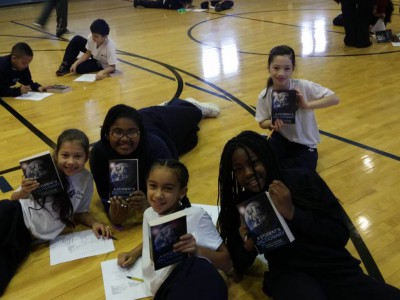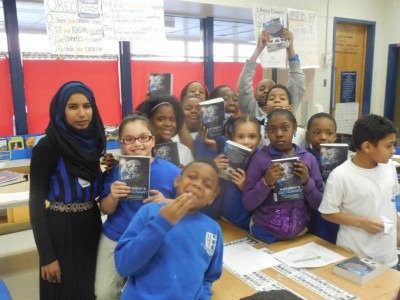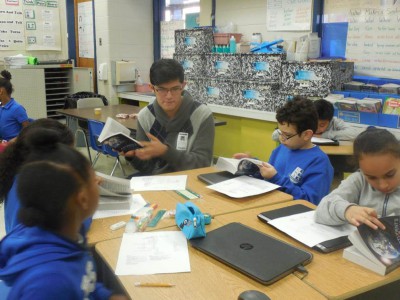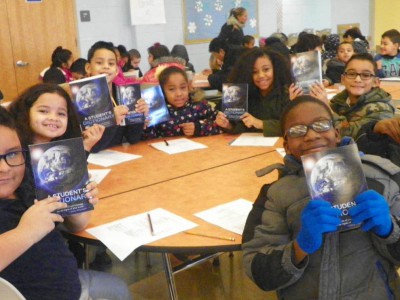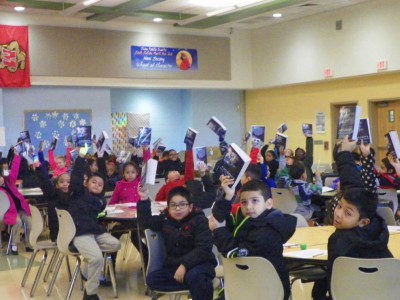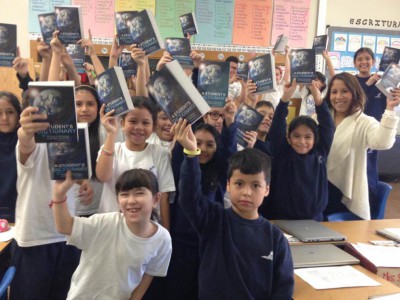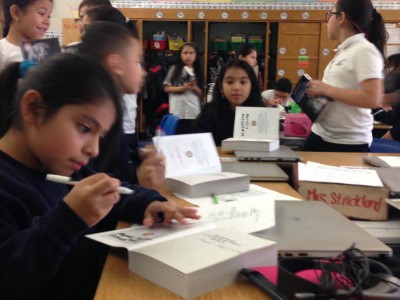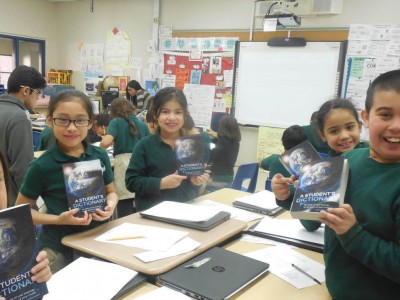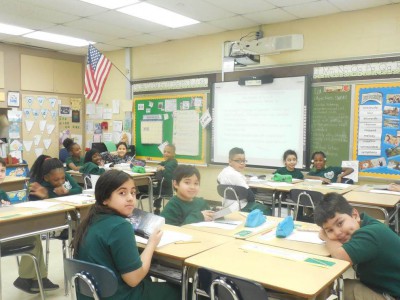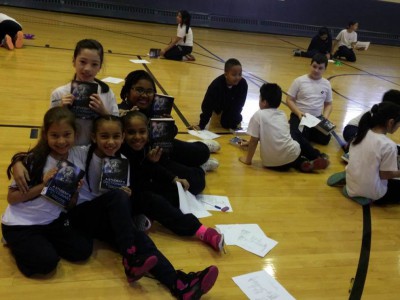Coronado, CA 92178
2016 February Newsletter
Word of the Month: Share
verb:
1. to let someone else have or use a part of (something that belongs to you)
True generosity is an offering; given freely and out of pure love. No strings attached. No expectations. Time and love are the most valuable possession you can share.

2. to possess the same trait or similar disposition with another or others
We are all different. There is no such thing as a standard or run-of-the-mill human being, but we share the same human spirit.

3. to talk about one’s thoughts, feelings, or experiences with others
The worst part of holding the memories is not the pain. It’s the loneliness of it. Memories need to be shared.

noun:
4. an interest in a company’s stock; any of the equal portions into which property or invested capital is divided
The person that is buying a share of stock is convinced he knows something that the other person who’s selling it to him does not know.
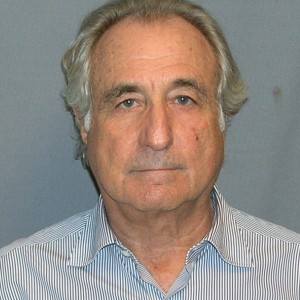
5. a part or portion of a larger amount that is divided among a number of people
A good leader takes a little more than his share of the blame, a little less than his share of the credit.

How a Paperback Dictionary Promotes Sharing
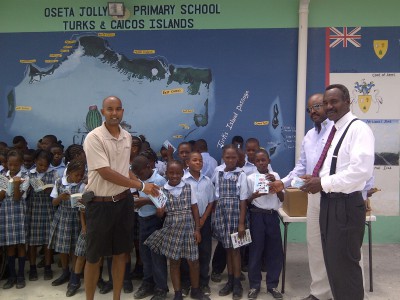
Sponsors
When sponsors take the time to visit each classroom to present the dictionaries to the children, they have the opportunity to share with students the importance of learning new words and their meanings and spelling words correctly. These dictionary skills help students form new associations by learning unfamiliar words as they expand their vocabulary.
Giving a personal dictionary also shows children that there are individuals in the community willing to share their time and resources in order to help students succeed in school and in life.
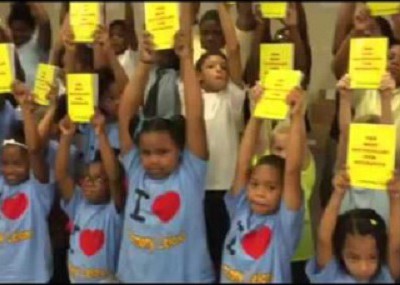
Students
Learning dictionary skills helps students become better readers and writers; the children will acquire the ability to share their thoughts, feelings, and emotions in their writing.
After receiving a personal dictionary, the children have the opportunity to share with others what they have learned, as well as the kindness they have received from our sponsors.
New York Grange Continues The Dictionary Project Tradition
Thanks to the members of the Greenfield Grange #807, receiving a dictionary has become a tradition for the third graders in Saratoga County. For over ten years, Greenfield Grangers have collaborated with The Dictionary Project to promote education in their community.
This year, Project Coordinator Dorothy Rowland and fellow members of the Greenfield Grange visited Greenfield Elementary School to give every third grade student a dictionary. Members go the extra mile by personalizing the dictionaries with each student’s name. The teachers and children are always pleased with the project and look forward to the kindness and generosity of the Grange next school year. Thank you Greenfield Grange for including The Dictionary Project in the good work you do in your community!
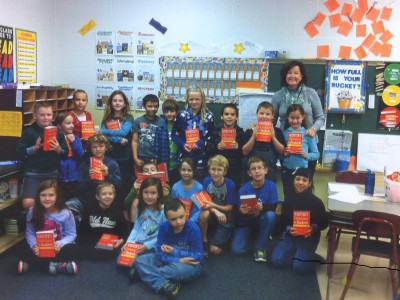
Massachusetts Rotarian Shares More than Just the Gift of Words
The Rotary Club of North Andover has participated in The Dictionary Project since 2008. Spearheading their program is an energetic retired teacher of 35 years, Barbara McGovern. This past fall Barbara wanted to expand her outreach beyond the traditional dictionary project she does in North Andover.
After reading an article about the economic hardship in McDowell County, West Virginia, McGovern decided to coordinate a community service project to help a struggling township in Appalachia.
The fourth grade class at Southside K-8 was brought into the Media Center for an exciting dictionary presentation. Barbara first explained that a dictionary lists words alphabetically and provides a word’s definition, or meaning. She asked the class, “Do you know the meaning of the word totem?” Most shook their heads and looked around the room for an answer. “A totem is a person or thing that represents an idea,” Barbara explained. “Anything can be a totem – a coin, a toy, figurine, a picture, you name it.” She held up a toy Mickey Mouse. “This is my totem for happiness because whenever I see Mickey’s face I cannot help but smile.” The students were encouraged to think of objects or people that make them happy. “Once you have a totem that reminds you to smile or laugh, you can always think of it when you are having a bad day, or feeling sad.”
After the success at Southside K-8 School, McGovern has decided to add a school in Appalachia each year. This fall she plans to go to Grant County in Northern West Virginia.
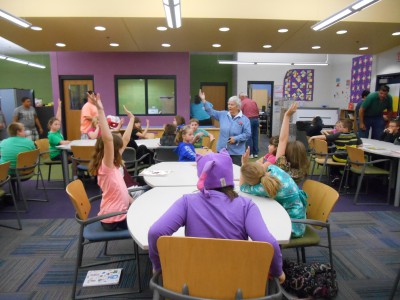
Presentation Ideas from New Jersey:
Over the last eight years, the Rotary Club of Elizabeth, NJ has provided 20,000 dictionaries to third grade students in the cities of Elizabeth and Hillside. This year, a new club member came up with an interactive worksheet to aid in their dictionary presentation. A crossword puzzle was generated which incorporated several environmental STEM vocabulary words. The activity gave the students the opportunity to use their dictionaries while also learning a few eco-friendly words. As the students worked on completing the vocabulary game, Rotarians reiterated the importance of learning dictionary skills. The crossword puzzle was enthusiastically received by both the students and the Board of Education and will be incorporated again in next year’s presentation.
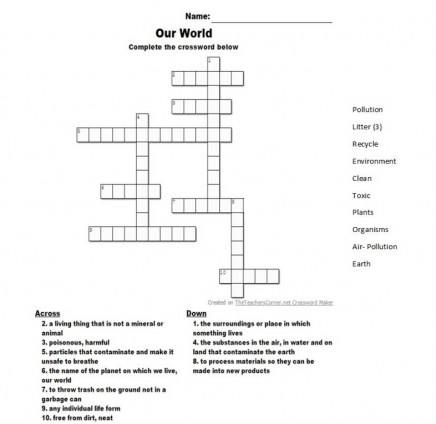
The goal of the Rotary Club Elizabeth Dictionary Project is to expose third graders to the benefits of using a dictionary. We want to develop a lifetime habit of using a dictionary.
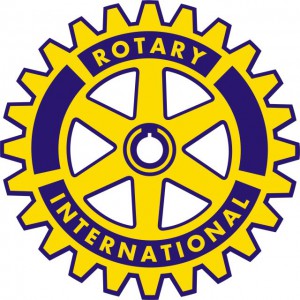
Maine Grange Values a Paperback Dictionary as a Modern Teaching Tool
With the popularity of computer technology, users have become accustomed to spell-check and auto-correct. Although these features are convenient for adults, they fail to teach young students how to identify and spell words correctly on their own.
Fortunately for the children of Androscoggin County, the West Minot Grange #42 provides paperback dictionaries to third graders at Minot Consolidated School. Since 2004, members have donated over 400 books to ensure these students have the opportunity to enjoy the benefits of owning a dictionary. The Dictionary Project appreciates the Grangers for encouraging children to use their dictionary at school and at home so that they will be able to use the English language effectively.
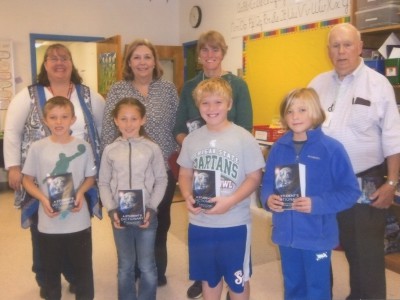
Rotary’s Dictionary Project Comes Full Circle in Massachusetts
After learning about The Dictionary Project in the late 90s, the Rotary Club of Acton-Boxborough decided to visit several local elementary schools to hand out personalized dictionaries. Little did they know, one third grade student from their 1998 project in an Acton-Boxborough School would become a third grade teacher.
Today, Mairin Gulliver teaches at Luther Conant School in Acton, Massachusetts. This year when Rotarians visited Ms. Gulliver’s class to present the dictionaries to the students, she told them that she received her personal dictionary from the Rotary Club when she was in third grade and still has it! She recalls the day when Rotarians came to her class and gave each student their own book. “I remember taking my book home and flipping through the pages to find new information,” said Mairin. Today, she uses the donated dictionaries in her classroom to teach basic dictionary skills through a Treasure Hunt activity. After the strategy-based lesson, the students get to take their books home to use for their spelling and language arts practice work sheets.
When asked why paperback dictionaries are important, Mairin explained that having a personal dictionary puts each child on the same playing field. Although resources and learning materials can be monitored in the classroom environment, teachers recognize that not every child has access to a computer – or even books at home. “Like our motto here at Luther Conant School, the whole child is the whole idea, we want our students to have every resource available to be successful,” said Mairin.
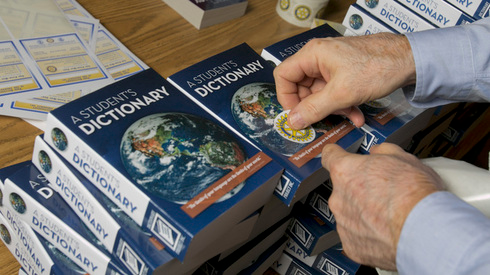


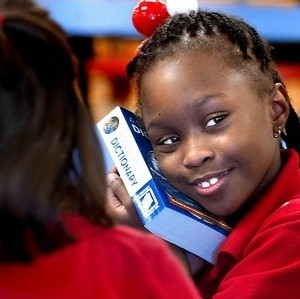
February Sponsor Spotlights
| Monday | Tuesday | Wednesday | Thursday | Friday | Saturday | Sunday |
|---|---|---|---|---|---|---|
| 1 The Dictionary Project, SC |
2 Chesterton Lions, IL |
3 Albemarle & West Stanly Rotary Clubs, NC |
4 Sparks Rotary, NV Warner Grange #117, OR |
5 Kansas City Dictionary Project, MO |
6 | 7 Mount Holly Rotary, NJ |
| 8 Galesburg Elks #894, IL |
9 Centre Rotary, AL |
10 |
11 Jamestown Elks #263, NY |
12 | 13 | 14 |
| 15 | 16 | 17 | 18 | 19 | 20 | 21 |
| 22 | 23 | 24 | 25 | 26 | 27 | 28 |
| 29 | 1 | 2 | 3 | 4 | 5 | 6 |

